Iran Preparing To Close UK Embassy In Tehran – Report
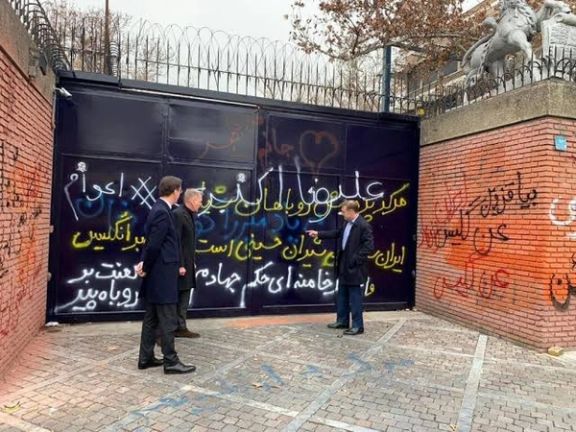
Iran is reportedly preparing to close the British embassy in Tehran as tensions simmer over a plot to kill journalists in UK, and London’s rebuke of crackdown on dissent.

Iran is reportedly preparing to close the British embassy in Tehran as tensions simmer over a plot to kill journalists in UK, and London’s rebuke of crackdown on dissent.
In an exclusive report on Friday, the Jewish Chronicle claimed that Iranian officials revealed “the possible step” at a secret meeting with ambassadors from Oman, Kuwait, and the United Arab Emirates on Tuesday.
The media outlet cited one of those present at the meeting as saying that the Islamic Republic plans to announce a range of new sanctions to hit back at Britain, which has imposed several rounds of sanctions since the current wave of protests began in the country sparked by the death in custody of 22-year-old Mahsa Amini in September.
On Wednesday, February 22, Iran’s Revolutionary Guard took credit for the relocation of Iran International studiosfrom the UK to the US following terror threats, calling it a victory for the Islamic Republic.
The British embassy in Tehran has been a regular flashpoint in recent years. In December 2022, its walls were defaced by the Basij paramilitary militia, one of the forces operating under the IRGC, with slogans labelling it a “terrorist center”.
According to UK Security Minister Tom Tugendhat, Iran is also hiring organized criminal gangs to spy on Britain’s Jews in preparation for a potential assassination campaign against prominent community members. Earlier in the month, Jewish journalist Catherine Perez-Shakdam -- who infiltrated the regime and met Supreme Leader Ali Khamenei -- told the JC the plans were designed to ensure “the diaspora would have a very nasty surprise” in the event of an Israeli attack on Iran’s nuclear facilities.
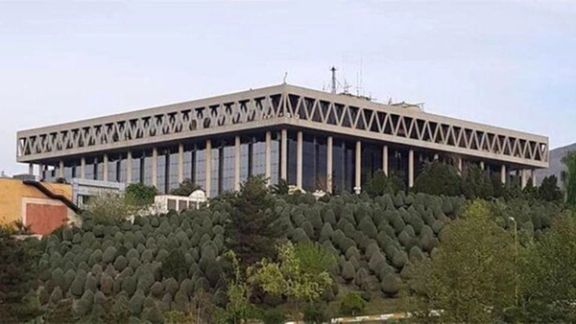
Washington says it has renewed a waiver of sanctions against Iran’s state radio and television establishment, the IRIB, on the basis of US national interests.
State Department spokesperson Ned Price said during his press briefing on Thursday that the US periodically reviews this waiver to allow the provision of satellite broadcast service to the IRIB under the auspices of the International Telecommunications Satellite Organization, or ITSO.
Trying to justify the decision by the administration, he said that "this waiver has been renewed by successive American administrations without any interruption since 2014. The waiver has been issued close to 20 times – some 18 or so times – in recent years.”
Despite Price’s claim that Washington uses every single available tool to hold Iranian authorities accountable for their human rights abuses and for their censorship, the waiver seems to contradict repeated pledges to support the Iranians who for over five months have been protesting against the regime and its leaders.
The sanctions waiver raises more questions as Price said, “We are and remain seriously concerned by the IRIB’s role in censoring the Iranian people’s access to information and its involvement in human rights abuses.”
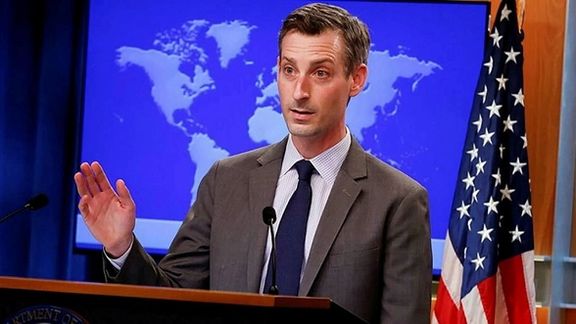
With a wording meant to minimize the effects of the waiver, Price said that “While this narrow waiver allows for the provision of satellite broadcast services to IRIB, IRIB and its senior leadership remain subject to US sanctions under various authorities, including for their involvement in censorship and human rights abuses.” He was referring to a series of recent sanctions on IRIB officials, including its president Peyman Jebelli and the chief of the world service Ahmad Norouzi. Two brothers of Jebelli, close to Ali Khamenei's son Mojtaba, have recently defected and sought asylum in the US.
While the sanctions on leaders are important, the waiver for IRIB allows it to continue to broadcast regime propaganda and forced confessions of prisoners on international satellites.
Price dodged a direct answer about the reason behind the waiver, saying, “These are underlying conditions that we look at every time this waiver comes up for renewal. We ultimately are going to do what is in our interest but ultimately what we deem to be most effective to promote the aspirations of the Iranian people.”
Questioned to elaborate on these “national interests,” he only said that “these are complex issues involving our membership in the ITSO, involving a number of factors, but we look at this very carefully through every single lens.”
Defending the decision, he said, “we have made the judgment call, as have previous administrations multiple times over every 180 days, that waiving these sanctions are in our interest.” He continued, however, “We also believe it’s in the interest of our ability to protect, to promote the aspirations of the Iranian people.”
Amid measures targeting the Islamic Republic’s financial and energy sectors, under Executive Order 13846, by then President Donald Trump in 2018 after he withdrew the US from the 2015 Iran nuclear agreement – US government departments are empowered to sanction entities implicated in “censorship or other activities with respect to Iran on or after June 12, 2009, that prohibit, limit, or penalize the exercise of freedom of expression…or that limit access to print or broadcast media.”
The US first designated IRIB (Islamic Republic of Iran Broadcasting) in 2013, and in 2018 reimposed the move in what then Treasury Secretary Steven Mnuchin said was a part of “the maximum pressure exerted by the United States” after withdrawal from the 2015 nuclear agreement.

After long airing forced televised ‘confessions’ of dissidents, Iran's regime is increasingly coercing individuals to post dictated statements on social media.
Last week a video of a woman unveiling at an official event in Tehran went viral on social media. On Wednesday, the same woman posted a video of herself apologizing for her “rash” behavior.
Zeynab Kazempour, an engineer, removed her headscarf during the annual assembly of Tehran Construction Engineering Organization (union) after her application to run as a candidate for the board was turned down, presumably on the grounds that she did not abid by the compulsory hijab rules.
In the video, Kazempour is making a short statement on the stage of packed auditorium -- with her headscarf around her neck instead of her head -- about being excluded from the union’s elections. She then throws the headscarf on the floor while storming out as many of her male and female colleagues, both on the stage and among the audience, cheer and applaud her.
“I reacted momentarily, without premeditation … I regret [my reaction] and apologize to the public,” she says in the video.
“Releasing this type of videos has long precedence,” Dadban, a team of volunteers who provide legal advice to activists and protest victims, tweeted Wednesday, adding that security bodies are now forcing dissidents to make coerced statements in front of their own cameras instead of the cameras of the security forces for television.
Iran's state-run television has aired the so-called “confessions” or forced statements of dissidents, activists, individuals accused of terrorism, economic sabotage, blasphemy, and even family members of government violence victims since the very early days of the Islamic revolution to justify prosecution, or execution, of individuals and to discredit opposition groups.
In October, statements very likely to have been acquired under duress from dissident rapper Toomaj Salehi were aired by the state television.
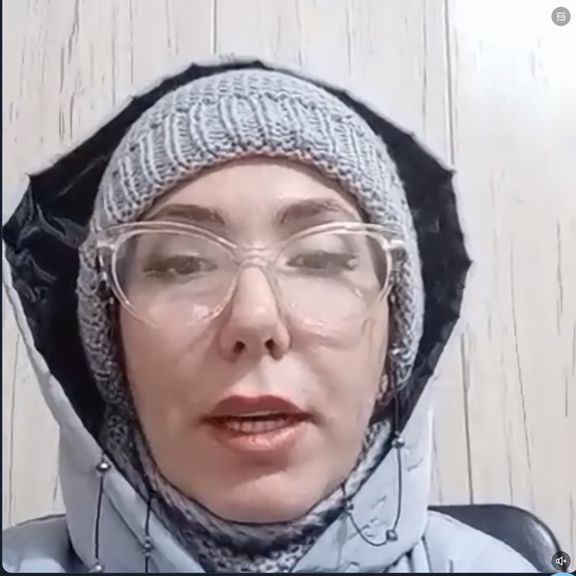
Many Iranians also believe that since his arrest in September, and being released on bail in October, another popular artist Shervin Hajipour whose song “Baraye Azadi” (For Freedom) has become an anthem for Iranian protesters has been under pressure to post “dictated” content on Instagram.
Shervin whose song won this year’s Grammy Awards’ “Best Song for Social Change”, a new category, said in a post on Instagram after his release from prison that he was sorry that his song was being used by dissident political groups outside Iran. After winning the award he also said in a post he regretted that his award was presented, in absentia, by the US First Lady Jill Biden.
The once quite effective televised “confessions” have largely lost their clout in the Iranian society where many repudiate them as mere propaganda. As a counter-measure, many now even refuse to share or like social media posts that they think have been dictated to the author by security forces or extracted under duress in prison and even block those who circulate such videos on their accounts.
“Such [coerced] confessions may have worked in the early days of the revolution but fortunately they have lost their [desired] impact now due to being repeatedly used for all sorts of things. These have even made the incompetent security organs the butt of jokes,” Maziar (Mazyar) Ebrahimi, a businessman who was tortured to ‘confess’ that he had been spying for Israel and was involved in the assassination of Iranian nuclear scientists in 2012 tweeted about the airing of anti-compulsory hijab activist Sepideh Rashno’s forced statements in August.
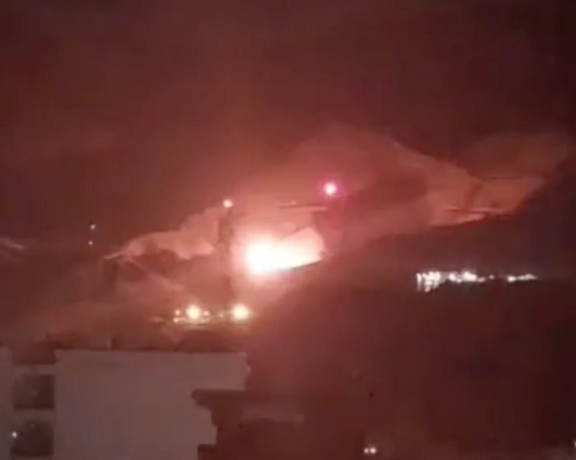
Residents near Karaj, west of Tehran, published videos of anti- aircraft fire Thursday night, which the government media described as military drills by the IRGC.
One of these videos showing anti-aircraft tracer rounds soaring into the sky an explosion can also be seen on the ground, but no further information is available. There was no prior public notification of planned military exercises.
Some residents reported on social media that first a series of explosions were heard and then anti-aircraft guns began firing into the air.
Fars news agency affiliated with the Revolutionary Guard reported Thursday night that the sound of guns firing and explosions were coming from drills by IRGC’s paramilitary Basij forces in Shahid Motahari military base near Karaj, about 30 km west of the capital.
Iran has been the scene of several suspected air attacks and sabotage operations since July 2020, largely ascribed to Israel. Any sound of aircraft or explosions usually jolts the population and leads to speculations of another attack taking place.
Serious acts of sabotage targeted Iran’s nuclear installations in 2020 and 2021 and several unexplained explosions occurred at military and naval bases.
The latest incident occurred on January 28 around midnight when a military manufacturing center in the city of Esfahan was attacked by drones.
The Wall Street Journal quoting unnamed US officials reported that the attack was carried out by Israel.
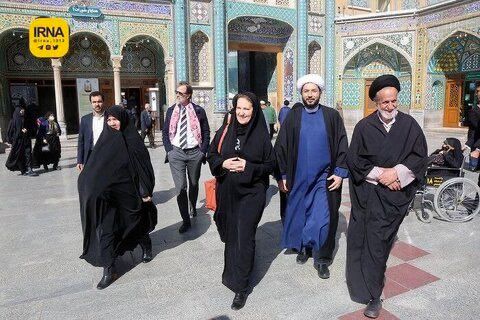
The Swiss Foreign Ministry defended the decision by its ambassador in Tehran, Nadine Olivier Lozano to wear the full body veil, the chador, on a visit to Qom yesterday (Wed) following global outrage claiming the undermined five months of protests against the compulsory hijab.
Léa Zürcher, the Foreign Ministry spokesperson, claimed the ambassador had visited the holy city of Qom to attend an interfaith event at an unnamed university. Zurcher claimed “a short visit to an important religious site took place” and “the applicable dress protocol for women was followed”.
However, the black chador which covers the whole body, is not required of visiting female foreign dignitaries who can simply wear a long headscarf at the site.
Social media was flooded with condemnation, including leading political voices around the world who said the move flew in the face of global support for the protests which were sparked by the death in custody of Mahsa Amini, arrested by the morality police for the inappropriate use of her hijab. The nationwide protests have since seen hundreds killed and thousands more arrested since September in brutal crackdowns by security forces.
Hillel Neuer, Executive Director at Human Rights Watch, tweeted: "Meet Nadine Olivieri Lozano, Swiss Ambassador to Iran and star of the murderous regime's propaganda. While women in Iran are being beaten, blinded, tortured, raped and killed for daring to protest the compulsory hijab laws, she is complicit in her head-to-toe chador and hijab."
The Swiss embassy, responding to the global outrage, denied the move undermined the human rights aspect of the protests which deny women the basic right to choose how to dress.
“Switzerland repeatedly and clearly takes a stand on human rights violations in Iran,” Zurcher added. “In recent months, it has repeatedly and unequivocally condemned the use of violence against the demonstrators at various levels and also called on the Iranian authorities to choose the path of de-escalation and to seek dialogue with the demonstrators.”
During the visit, Lozano is seen with several clerics, gifted a religious book from one of the shrine’s caretakers at Iran's second most holy city, after Mashhad, home to the biggest and most prestigious of Iran's Shiite seminaries. Qom has been at the center of controversy for years, its institutions being disproportionately funded, not least, while the country is suffering from a bitter economic crisis.
Institutions such as the Al-Mustafa International University attract foreign students from countries across China, Africa and Latin America, teaching them the foundations of Shia Islam to take back to their countries, at the expense of the Iranian people, while millions of Iranians cannot afford to eat or heat their homes during the bitter winter months.
Masih Alinejad, a leading Iranian activist in exile, whose life was recently threatened by the country's security forces, called the ambassador’s decision “shameful” and a “betrayal to Iranian women”.
She tweeted: “While teenagers & women are getting beaten, jailed & killed for saying NO to forced hijab, NO to gender apartheid regime, Swiss ambassador in Iran obeyed forced hijab …Switzerland must respond why they took side with our killers.”
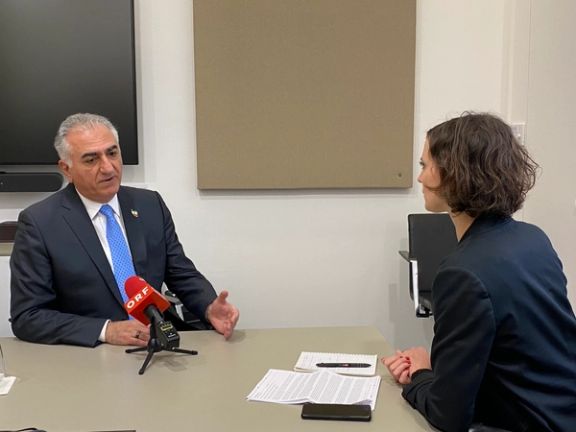
Exiled Prince Reza Pahlavi has once again called on Europe to embrace the “revolution in Iran” while enumerating the benefits of a secular democracy in Tehran.
In thread of tweets extracted from his interview with Austrian national public broadcaster ORF on Thursday, Pahlavi said the strategy of European countries vis-a-vis Iran should be focused on empowering the people while isolating and weakening the Islamic Republic.
Since Europe is geographically near the borders of Iran, it is especially exposed to challenges aggravated by the Islamic Republic, such as security risks and energy demands, he added, noting that the regime is “an unreliable and largely unavailable supply partner in energy,” and “in commerce, an economic market that is neither attractive nor safe as a target for trade or investment.”
He described the policy of engaging with the regime as “betting on a dead horse” and elaborated on how it works against the security interests of Europe. He touched upon some of the issues that the Islamic Republic has been creating for the European countries such as promotion of Islamic extremism and planning and perpetration of assassinations and terror plots on the continent.
He referred to millions of asylum seekers at Europe’s borders, underlining that most of these migrants are coming from the countries that have been hit by unrest due to the destabilizing acts by the Islamic Republic and its proxy militias.
He particularly mentioned the regime’s military support for the Russian invasion of Ukraine that has caused numerous problems for other European countries. Iran’s Islamic government has supplied hundreds of drones to Russia since mid-2022 that have been used during missile attacks to swarm Ukrainian air defenses. Increasingly short of missiles to sustain its brutal bombing campaign of Ukraine’s towns and cities, Russia has turned to Iran and also North Korea to replenish its stocks.
Prince Pahlavi also denounced the Islamic Republic’s diplomatic blackmail via nuclear proliferation, warning the international community against negotiating with Iran as pundits believe that the regime will not be able to harness its growing inflation without lifting US sanctions.
He also talked about the policy of hostage-taking by the regime and using foreign nationals in the country as bargaining chips to get concessions from other countries. His remarks came on the same day that a hardliner newspaper in Tehran, which is funded by the Supreme Leader and its editor often speaks for Ali Khamenei, demanded that German embassy staff be banned from leaving Iran in response to expulsion of two Iranian diplomats from Berlin.
Pahlavi called it political shortsightedness “to engage the Islamic Republic rather than its opposition” especially at a time when the uprising of the people is yielding results and a secular democrat Iran “would solve many of Europe’s prevailing security issues instantly.”